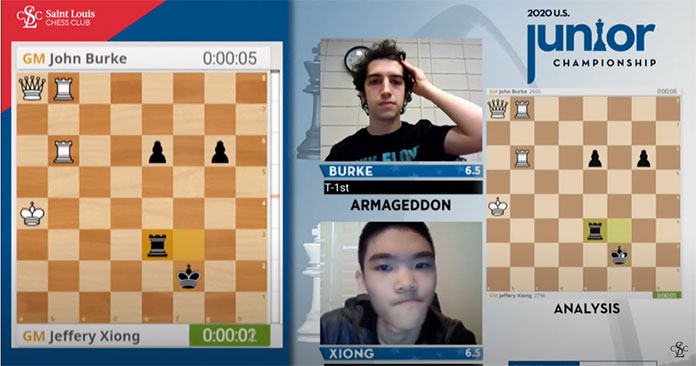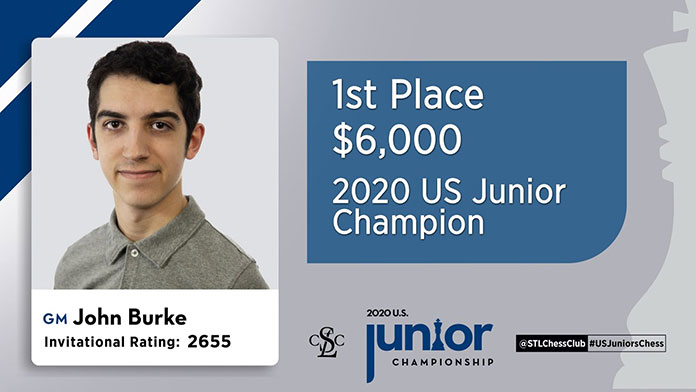
BRICK – Township chess prodigy, John Burke, 19, was named 2020 U.S. Junior Chess Champion, an elite national championship event hosted by the St. Louis Chess Club in Missouri, which is the chess capitol of the United States.
Along with the prestigious title, Burke also won some $20,600 in prizes and a $6,000 scholarship to be used at the institution of his choice.
The three-day tournament concluded on October 15 when Burke competed against nine other boys who represented the strongest male chess players in America under the age of 20.
After nine nail-biting rounds, Burke won after a very close match against Jeffrey Xiong. For the first time in American chess history, the 2020 Chess Championships were held virtually because of the COVID-19 pandemic.

Burke is currently a sophomore at Webster University in St. Louis and agreed to a Zoom interview the day before the tournament started.
He said he found his passion at a young age after his grandmother introduced him to chess when he was only four or five years old. One day he was in the Brick Barnes and Noble with his father when he noticed a book – Chess for Dummies – and asked his father to buy it for him.
“I started reading it and became really interested, so from that point on I just basically kept going with it,” he said. “Then one day when I was about eight years old my dad entered me in a tournament – he didn’t tell me he was going to, he just sort of did it – at Brookdale Community College.”
Burke wasn’t familiar with tournaments and was very nervous. He lost two of the games, partly because he didn’t know the rules.
“I don’t want to make excuses, but there is a rule in tournament chess which I was not aware of called ‘The Touch Move Rule’ which means if you touch a piece, you have to move it, even if it’s detrimental to you, so because of that I ended up losing the first game,” he said.
He continued to participate in local tournaments and eventually his family hired a coach which helped him to improve.
For most tournaments, everyone plays the same amount of games, Burke explained. Winners get paired against other winners and the losers get paired against the other losers. As a tournament progresses, players get paired with others who have the same number of points, so competitors can keep playing until the last round.
Tournaments can last for a day or for over a week.

Burke said he believes he plays at the same level, virtually or in person (also called “over the board” games). He prefers in-person because it’s more familiar to him, and he said he enjoys being across from his opponent, which is something that is lost in virtual games.
“I guess what I enjoy most about chess is it’s a perfect information game,” he said. “Compared to something like poker where there is an element of bluff and luck, in chess there’s none of that. It’s all skill basically.
“Everything is out on the board in front of you, and on any given day, the best player is normally the one who wins,” Burke said. “There’s not really an element of luck or chance. You always feel like you deserve to win or you deserve to lose.”
He said thinking ahead and the ability to recognize patterns go hand-in-hand while playing chess.
“So if you come across a pattern in a game you’ve studied beforehand, then it’s easier for you to understand what’s going on,” he said.
“If you compare a completely random position that doesn’t really conform to a specific pattern, even the best players in the world – it would not be easy for them to think very far ahead just because they’re not used to it.”
But if a familiar pattern is on the board, Grandmasters are able to look very far ahead and anticipate many moves in advance, he explained.
There’s not an infinite number of chess positions, but the number is “more than grains of sand on the beach – I think that’s the statistic,” Burke said.
There are some important patterns, strategies and tactics that refer to a specific configuration of pieces on the board for strategizing a long-term goal.
The number of moves in a chess game vary from a low of about 20 (when one plays badly) to more than 100 moves. Games average about 40 moves, Burke said.
Before a tournament Burke said he prepares by studying, working with a coach, and playing other people. Participants learn the names of their competitors and are able to access their past games and see their trends and strategies.
“A long-term strategy is a long-term plan for improvement throughout the game. As you improve with chess and as you study you become more familiar with these things and it becomes second-nature,” Burke explained.
The lifelong Brick resident is an American chess grandmaster. He achieved the FIDE Master title in August 2015 and the International Master title in April 2016, and in April 2018 was awarded his Grandmaster title. He reached an Elo rating of 2601 in September 2015, making him the youngest player ever to reach a rating of 2600 or above.
After graduation Burke said he hopes to make a career out of chess by coaching, writing articles, doing online video lessons.
“There’s definitely a market for it,” he said.







